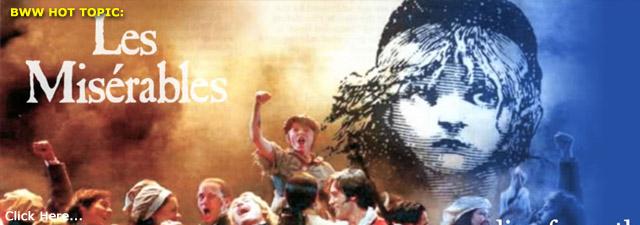Les Miserables: Do You Hear The People Belt?
Hot young boys are staging a revolution, dozens of actors are getting a good cardio workout walking against a revolving turntable and the evening's grandest fanfare is for the entrance of a wall. Yup, Les Miserables is back in town after bidding adieu to Broadway three and a half years ago.
Not exactly a revival – more of a return engagement – this Les Mis is pretty much a replica of the last one, by careful design of producer Cameron Mackintosh who, for the past 21 years has sent the show with the familiar Little Cosette logo out to 38 countries to be performed in one of 21 languages while his original London mounting is still going strong. Despite an exceptional ensemble of actors putting their own spins on the original 1985 John Caird/Trevor Nunn direction, for now and seemingly forever, there will be no revolutionary new interpretations of the Les Miserables experience.
Why so popular? Perhaps it's because the authors (Let me see if I can get this right: written by Alain Boublil and Claude-Michel Schonberg, based on the novel by Victor Hugo, with music by Schonberg and lyrics by Herbert Kretzmer, based on the original French text by Boublil and Jean-Marc Natel with additional material by James Fenton and adapted by John Caird and Trevor Nunn) have written a piece that has more in common with grand opera than musical theatre. I'm sure that even the greatest fan of Les Miserables would agree that its English text, which skims through the novel in narration-heavy recitative and song lyrics that use broad-stroke imagery, is not exactly the show's strongest feature. No, this is a show where the emotional sweep of the music is what carries the audience through Hugo's epic story, not the words they accompany. You need not know the language to find yourself carried away by emotional singing, passionate high belting and visuals that have no use for subtlety. All you gotta know is who's the guy who stole the bread, who's the mom with the deadbeat dad and which girl needs a copy of He's Just Not That Into You.
And the cast assembled for this time around John Napier's turntable set sure sings the hell out of this one. At age 27, Alexander Gemignani does looks a tad young to be playing a man who has been working on the prison chain gang for 19 years, but though his Jean Valjean may lack some of the necessary world-weariness he certainly sounds lovely, especially in a heavenly falsettoed "Bring Him Home." The sweetly mellow tones of Norm Lewis may be an unusual sound for Inspector Javert, but they help make him seem nobler and more sympathetic. The power he gathers by the second act is enthralling.
Celia Keenan-Bolger seems a tigress as soon as she hits center stage as Eponine, and attacks "On My Own" with the most searing dramatic and vocal heat of the evening. Daphne Rubin-Vega takes the opposite approach with Fantine's "I Dreamed A Dream," singing in the child-like tones of a woman who never had a chance to grow emotionally. Her Fantine is a tragically defeated woman unable to make sense of her past and too weak to fight for her future. It's quite moving.
Aaron Lazar lets loose with some glorious vocals as revolutionary leader Enjolras and Adam Jacobs (Marius) and Ali Ewoldt (Cosette) make for an appealing enough couple in their rather thankless roles. Gary Beach is in splendidly comic voice and rubber face as Thenardier and he and Jenny Galloway, as his spouse, make the most of their amusing antics.
But if you're like me the most intriguing aspect of the Broadway return of Les Miserables is the inevitable batch of new parodies Gerard Alessandrini will be inspired to write for Forbidden Broadway. Perhaps a bit about how Cosette's dad is some slacker rock musician Fantine hooked up with in the East Village…
Photos by Joan Marcus: Top: Alexander Gemignani and Norm Lewis
Center: Aaron Lazar
Bottom: Celia Keenan-Bolger and Adam Jacobs



